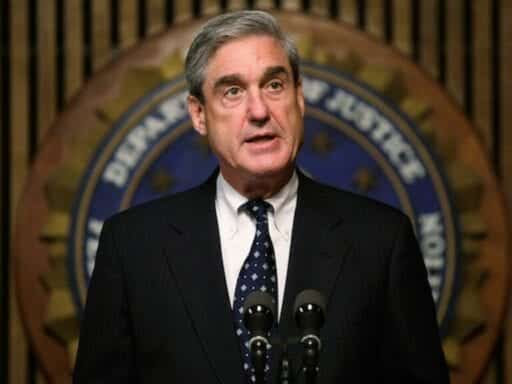Vox Sentences is your daily digest for what’s happening in the world. Sign up for the Vox Sentences newsletter, delivered straight to your inbox Monday through Friday, or view the Vox Sentences archive for past editions.
Mueller holds a surprise news conference; the Mount Everest death toll is alarmingly high this year.
Mueller finally speaks up
/cdn.vox-cdn.com/uploads/chorus_asset/file/16307408/Sentences5.29.170801.jpg) Alex Wong/Getty Images
Alex Wong/Getty Images- A long-awaited statement from special counsel Robert Mueller finally came during a surprise news conference on Wednesday. [AP / Eric Tucker, Michael Balsamo, and Chad Day]
- The main takeaway from his speech (which mostly revolved around the published findings from his report): He declined to clear President Trump of obstruction of justice. [CNN / Jeremy Herb, Katelyn Polantz, and Laura Jarrett]
- Rather, he said that charging the president was an option his office could not consider because Justice Department policies prohibit charging a sitting president with a crime. He said it is Congress’s decision whether to consider impeachment. [WSJ / Byron Tau]
- This is a stark contrast from how Attorney General William Barr had characterized the findings of the report, as he had said there was insufficient evidence to charge the president with obstruction of justice. Trump, too, has repeated “no collusion, no obstruction.” [NYT / Sharon LaFraniere and Eileen Sullivan]
- He also signaled his reluctance to testify before Congress, who has been trying to schedule a hearing with him for weeks. He said that the report is his testimony and that he wouldn’t be revealing more in front of lawmakers. [Politico / Natasha Bertrand]
- Several members of Congress, including 2020 Democrats, have responded to the news conference, many saying that it is their legal and moral obligation to begin impeachment proceedings. [USA Today / Christal Hayes]
- Mueller has resigned from the DOJ now that his investigation complete. The debate over his findings, however, is far from over. [Vox / Andrew Prokop]
Overcrowding may be contributing to Everest’s death toll
- A concerning number of deaths have been reported from Mount Everest, and the growing crowds are part of the issue. [Washington Post / Ankit Adhikari and Joanna Slater]
- 11 people have died on the mountain so far this year, and experts say the growing number of inexperienced climbers are a major danger to themselves and everyone around them. [CNN / Sugam Pokharel, AnneClaire Stapleton, and Lauren Said-Moorhouse]
- The hike to the summit is not an easy one, and climbers can only take a limited amounted of compressed oxygen –– which is why even one or two hours’ delay can be deadly. Yet some hikers have reported that queues have grown ridiculously long, leading to the deaths of some who had been held in line too long. [NYT / Kai Schultz, Jeffrey Gettleman, Mujib Mashal, and Bhadra Sharma]
- Some are accusing the Nepalese government of issuing permits recklessly to collect more money, this year reaching a record high of 381. Mount Everest tourism is a lucrative business for Nepal: Permits alone cost $11,000 for foreigners. [AP / Upendra Man Singh, Binaj Gurubacharya, and Emily Schmall]
- Nepal’s government has pushed back against criticism of its permitting process. It also said while it has no plan to restrict the number of permits, next year it will work to better manage the flow of climbers so that they don’t crowd the summit all at once. [NPR / Laurel Wamsley]
- A few mountaineers have also said the overcrowding claims are exaggerated and that the long lines are a once-in-a-year phenomenon. Crowds this season were especially bad because the window for clear weather was only three to four days long, and because China issued fewer permits for the Tibetan side of Everest than usual. [Nepali Times]
- Some Nepali officials such as Yagya Raj Sunuwar have spoken out about the need for a change in rules. Many are leaning toward requiring proof of prior mountaineering experience as well as of good health. [NYT / Bhadra Sharma and Jeffrey Gettleman]
Miscellaneous
- Uber has long had a policy of kicking drivers with low ratings off the app. Soon, it’ll do the same for low-rated passengers. [Business Insider / Graham Rapier]
- A man died from a drug overdose on a plane from Colombia to Japan. An autopsy revealed he had swallowed 246 packets of cocaine. [CBS News / Christopher Brito]
- An Australian teen went viral for egging a far-right politician over his offensive comments on the New Zealand mosque shootings that left 51 people dead. Now he’s donated all the money he raised for his legal fees to those affected by the shooting. [AP]
- No wonder there’s such a buzz around the Scripps National Spelling Bee: The winner’s cash prize is $40,000. [CNBC / Alicia Adamczyk]
- File under “nightmare fuel”: A Florida man trying to use the bathroom in his apartment was bitten by a four-foot snake that slithered out of his toilet. [Fox News / Lucia I. Suarez Sang]
Verbatim
“If we had had confidence that the president clearly did not commit a crime, we would have said so. We did not, however, make a determination as to whether the president did commit a crime.” [Robert Mueller speaking during his news conference on Wednesday]
Listen to this: He bought the law
John M. Olin isn’t a household name. But his foundation played a crucial role in fueling the rightward turn of American politics, and particularly American courts, in the past few decades. On the Future Perfect podcast, the New Yorker’s Jane Mayer explains how that happened. [Spotify | Apple Podcasts]
Read more
Britain’s youngest billionaire is giving away his fortune — to people who don’t exist yet
The 15 best movies we saw at Cannes this year
Chick-fil-A’s many controversies, explained
“Co-living” is the new “having roommates” — with an app
Fosse/Verdon’s Joel Fields on how to wrestle with art made by terrible men
Author: Catherine Kim
Read More



